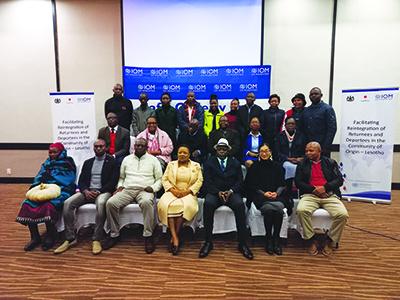
By Thoboloko Ntšonyane
MASERU – The outbreak of the COVID-19 at the beginning of 2020 had plunged the world into an unprecedented economic crisis due to stringent lockdown measures that many countries adopted forcing the suspension of the economic and social activities.
More especially the migrant workers bore the brunt of these tough measures in South Africa (SA) and were forced to return to Lesotho while some were stranded in that country as many workplaces suspended their operations, and others downsized employees while some closed shops.
Many Basotho migrant workers were affected by these developments.
The International Organization for Migration (IOM) in concert with the government of Japan introduced the ‘Socio-Economic Reintegration of Returnees and other vulnerable households in migration affected areas severely impacted by [the] COVID-19 pandemic’ project.
The line ministries, Labour and Employment, Social Development, and the beneficiaries have sung praises to the IOM and Japan sponsored project.
The project was hailed as life-changing during its closing ceremony termed, an “End of Project Dissemination Meeting for the Socio-Economic Reintegration of Returnees and other vulnerable households in migration affected areas severely impacted by COVID-19 pandemic” held in Maseru.
According to IOM, the project was aimed at addressing the COVID-19 pandemic impact on the returned migrant workers through market-oriented skills, training, and community development projects.
The $696 600 approximately M10.2 million project ran from March 2021 to March 2022. It has helped about 198 beneficiaries in the districts of Mafeteng, Mohale’s Hoek, Quthing, Qacha’s Nek, and Leribe and the target groups were the migration-affected communities.
Some of the projects that have received funding under the project are the cooperatives for agriculture and the bakeries. These projects received capital funding and start-up kits.
On the individuals, the project covered their training in bakery, recycling, bricklaying, mechanics, and computer studies.
The 198 beneficiaries are set to receive capital seed funding to the tune of $200, about M3 000.00.
Project Officer OM ‘Mabaruti Motsamai said IOM has been working with the DISCOSEC (District COVID-19 Secretariat) and District Disaster Management Team (DDMT) to identify vulnerable returnees from South Africa and provide skills training to restore their livelihood.
The project worked with the vocational training centers and the private sector for skills training and mentorship programs.
The project had targeted mostly returned Lesotho migrants from South Africa due to the strict COVID-19 outbreak in 2020 which forced many countries to place hard lockdowns that limited economic and social activities, a move that resulted in many people losing employment oportunities. Largely this population was the irregular migrants.
Head of Office IOM Lesotho Eriko Nishimura said the project is relevant to contributing to the economic recovery from the COVID-19 induced effects.
“This project covers only five districts, but even in the five districts, we reached the few we could reach. There are many other vulnerable returnees and other people who deserve similar support,” she highlighted.
Nishimura also mentioned that the project has had a hand in contributing to job creation, enhanced livelihood, and strengthening community resilience and solidarity.
“All our efforts were put to bring ‘’transformative changes to the people’s lives and migration affected [communities]’’ in the project area. We wanted to restore livelihoods, build resilience and give hope to the project beneficiaries and target communities. At this juncture, I thank all the stakeholders involved in this project. Without you playing a key role in this project, we could not have celebrated today. I sincerely appreciate your active participation, hard work on the ground, and commitment to [making] a difference
[in]
people’s lives,” she said.
One of the beneficiaries, Mokhathala Moleli could not hold his excitement saying they will now be able to create employment.
The beneficiary of computer training, further said the capital seed has come in handy for them to open a telecenter.
The Chairperson of the Mphatlalatsane project that is involved in farming and vegetable production ‘Malenka Mokoena appreciated the gesture, saying their project had made a significant impact.
This project had received the start-up kit in the form of advanced irrigation equipment.
About M200 000.00 has been invested in community projects.
The Japan Embassy representative Yuichiro Meguro said Japan wanted to help restore the livelihoods of affected Basotho migrants.
He further said that although the project has helped about 200 beneficiaries, there are many others similarly deserving, appealing to the government and the development partners to invest in similar projects.
For his part, Labour and Employment Ministry’s Principal Secretary (PS) Matela Thabane termed the project as an “eye-opener” for the government, saying; “it forces us to go back to the drawing board to review what the Government’s assisted return and reintegration programme entails”.
“From the endpoint of the Ministry of Labour and Employment, a commitment to urge the responsible officials to step up the existing reintegration interventions within the Ministry is put forth. Reliance on jobs abroad is an unstable course for Lesotho’s national economy, we need to find durable long-term solutions to tackle root causes,” he said.
Thabane further said that all stakeholders have a role to play as well as the reintegration is concerned, adding that more comprehensive, social development-oriented reintegration programs need to be explored.
The Deputy Principal Secretary (DPS) in the Ministry of Social Development Mahlapane Makakole thanked all the stakeholders who were involved in the project and also promised that the Ministry of Social Development will “ensure” the sustainability and continuation of these projects.


